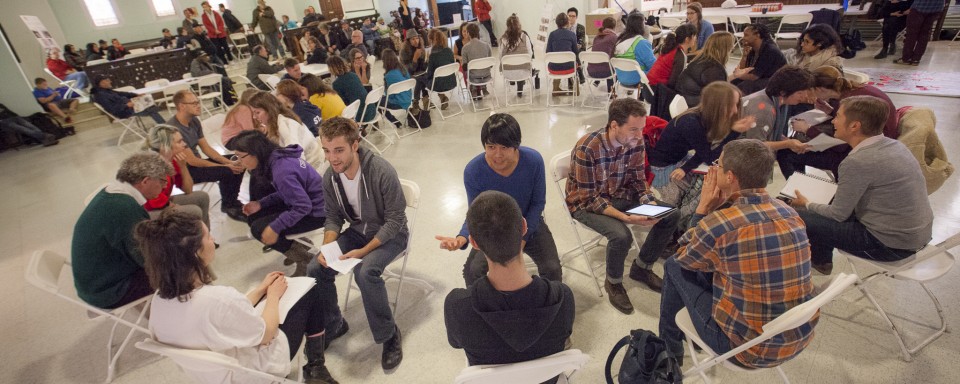by Mab Coates-Davies
Students of the Working Class Public History class reflected on their experiences of representing oral histories of Pointe-Saint-Charles which are part of the archive at the Centre for Oral History and Digital Storytelling.
I was nervous going into the speed dating exercise. I really enjoyed listening to June O’Donnell’s interview and felt a kinship with her without having met her. I think this is at least in part because she strongly reminds me of my grandmother. My grandmother was born a couple years before June and grew up across the country in Saskatchewan, but she has a similar sense of humour and approach to life around her. Perhaps this was a coping mechanism for me in trying to understand (and ultimately mimic) June, but it also made me more connected emotionally to June’s story. I was nervous that I would slip into talking as though I was acting out my grandmother during the exercise. I watched June’s interview again and listened particularly closely to the parts that didn’t remind me of my grandmother. I found that this re-listening helped me to focus less on the details of June’s life, and to understand her in a unique way than the time before. I found this to be an interesting lesson. In particular, I noticed when she laughed, particularly in the instance that she talks about her mother and grandmother both being abandoned by their husbands and raising their kids as single mothers. “Before it was in vogue.” she says. I remembered this line from the audio tour we did, but had forgotten the tone of her voice when she delivered it. I found myself taking June’s tone of voice and her laughter when she talks about the chocolate factory, the smells and the taste, and using that to construct my approach to representing her.
I found that reading the Julie Salverson piece before representing June O’Donnell during the speed dating exercise definitely changed the way I approached it. Salverson’s piece made me much more conscious of the act of talking “of” someone versus “to” them. I felt that taking the risk of representing June made me more self-reflexive and aware of myself, as well as myself as June. In a sense, Salverson made me more anxious about the act of representation, but also, in admitting her own mistakes and others around her, made me calmer. This paradox was completely undone when we actually started the exercise.
When we were actually seated I realized that the activity was moving a lot faster than I had imagined. Most of the time, my initial nervousness dissipated when I began listening to the other actor/interviewee. I found that because I was talking to someone about usually similar topics, and we had this communality in place, both coming from the Pointe, it was easy to feel comfortable. This connection helped ease the meeting, which is different than how Roger and Ana initially experience each other in the Salverson’s piece. I found myself genuinely interested in their stories, which was a characteristic that June emulates in her interview with Steven High.
I did have a moment of anxiousness though, and it occurred when I met myself in the circle. The other June had chosen to use an accent, which I hadn’t even considered doing during my preparation for the exercise. This threw me off a bit, but our interaction produced laughter as we realized we were both acting out June’s interview. Our stories became complimentary as I spoke, because we had chosen to focus on different parts of June’s life. It was the interview that challenged me the most, but I felt that it helped me as I progressed around the circle.
The short life interviews we had done before the speed dating with a theatre student helped me as well. When I stumbled when talking as June, I reminded myself that that was a natural part of talking about yourself. I hope that I managed to share a small part of June’s life, and that I represented her with kindness and respect, but ultimately I think that June did me a favour, by helping me to learn the anxiousness, awkwardness and potential for joy that comes with representation, and how to continue to think about and work with that feeling throughout the course.
by Mab Coates-Davies
